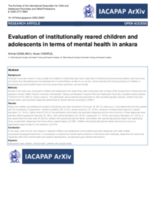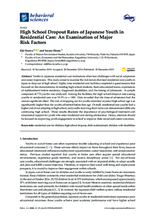Displaying 331 - 340 of 1482
The aim of this study was to investigate the status of children depression using the Children Depression Inventory (CDI) at 21 shelter care institutions in Terengganu, Malaysia.
The following evaluation looks at a dialectical behavioural therapy (DBT) skills group implemented with young females in a Scottish residential service.
This chapter describes a youth-centered approach to transition planning for this vulnerable population and highlights essential elements to consider during the process such as disability, mental health, trauma, resilience, self-determination, culture, and how trauma impacts mental health.
In this article the authors look for a suitable method which takes account of power relations while investigating young people's perspectives on their everyday lives.
This study examines the mental health symptoms of children in institutional care in Ankara, Turkey and possible factors that may cause these symptoms.
This study aimed to examine the risk factors that lead residential care youths in Japan to drop out of high school.
The current randomized control study aimed to determine, if a life skills-based intervention could improve the emotional health and self-esteem among Malaysian adolescents in orphanages.
The objective of this study was to provide data on the effects of bullying suffered at school on different cognitive and affective SWB measures (OLS, PWI and OHS) of early and late adolescents in residential care.
The objective of this work is to determine the factors associated with deciding to address family reunification from residential care (RC).
The objective of this work is to determine the factors associated with deciding to address family reunification from residential care.





